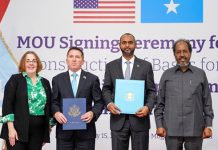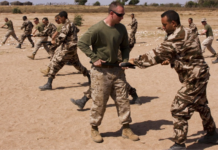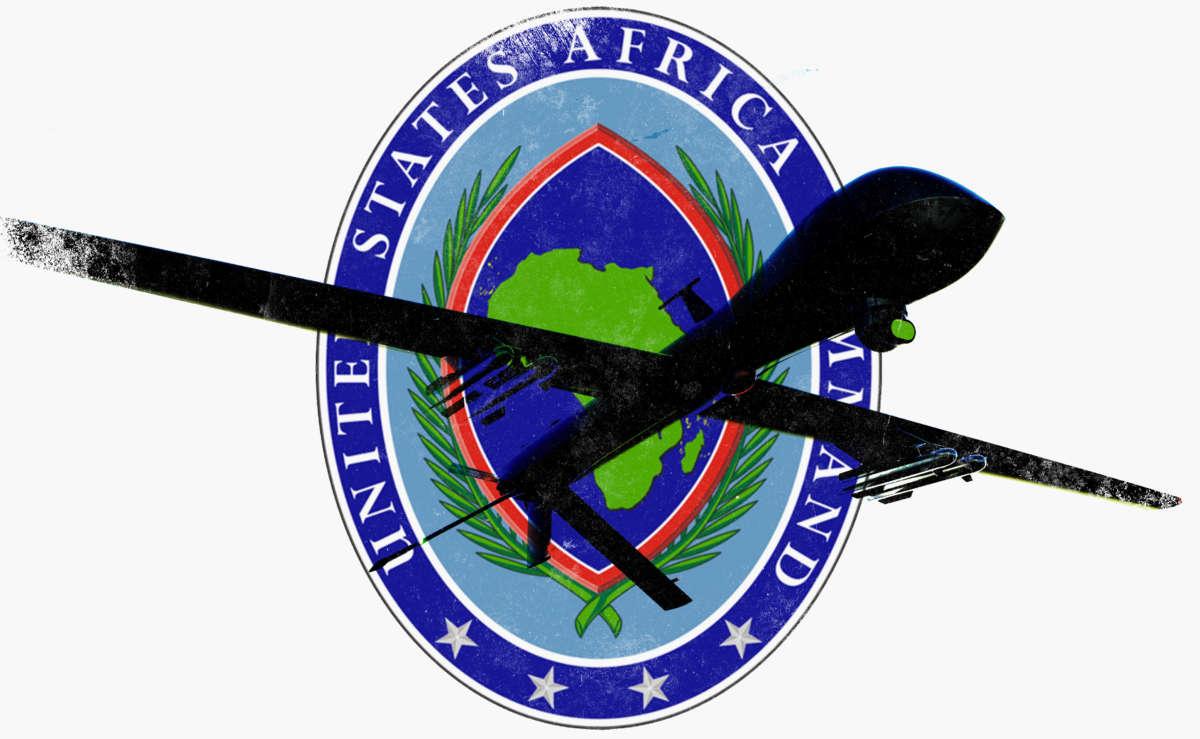
Current government is rife with corruption and infiltrated by al-Shabab though it has curried the favor of the U.S. by signing oil exploration agreement with U.S. oil company.
On January 21st, U.S. Africa Command (AFRICOM) reported that it had carried out a drone strike near Galcad, about 260 kilometers northeast of the Somali capital of Mogadishu, that killed approximately 30 al-Shabab fighters.
Two days later, AFRICOM announced that it conducted another drone strike near Xaradheere, around 246 miles northeast of Mogadishu, which it said killed another two al-shabab fighters.
AFRICOM referred to the first strike as a “collective self-defense strike” in support of Somalia National Army forces who were “engaged in heavy fighting following a complex, extended, intense attack by more than 100 al-Shabaab fighters.”
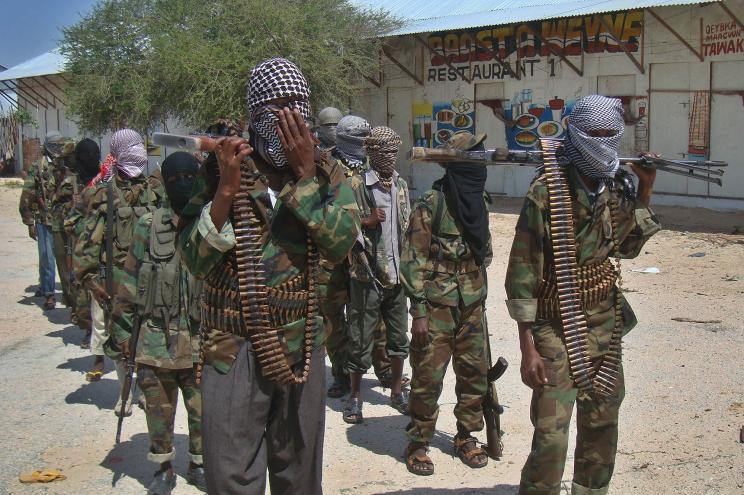
In the past, Amnesty International found that some of the Somalis killed by U.S. air strikes who were reported to be al-Shabab terrorists were in fact civilian farmers.
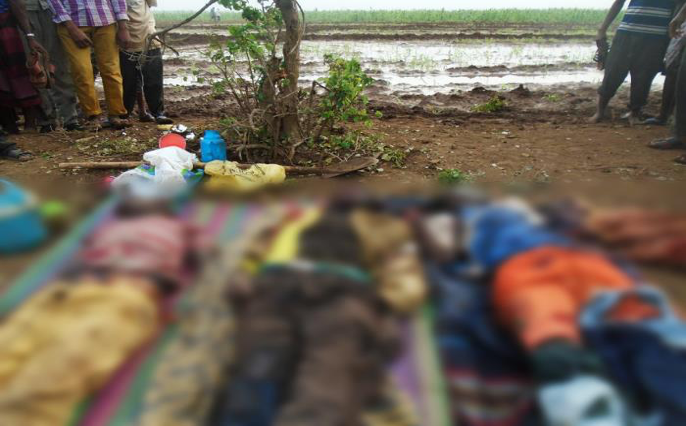
Amnesty International’s Somali researcher, Abdullahi Hassan, said after one such incident in October 2019 that “it’s bad enough that the U.S. Africa Command appears not to know who its air strikes are actually killing and maiming in its secretive war in Somalia. But it’s reprehensible that AFRICOM offers no way for those affected to contact it and has failed to reach out to the families of victims after its version of events was called into question.”
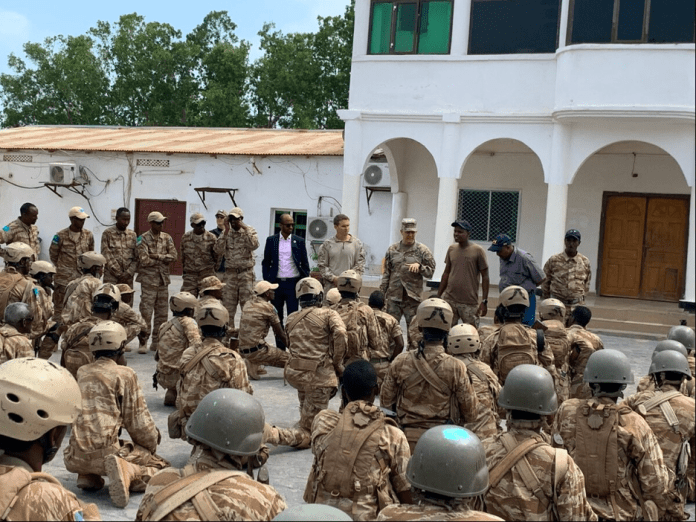
Redeployment of U.S. Troops
In May 2022, the Biden administration approved a Pentagon request to redeploy 450 U.S. troops to Somalia in a reversal of former President Donald Trump’s 2020 decision to withdraw all U.S. troops from Somalia.
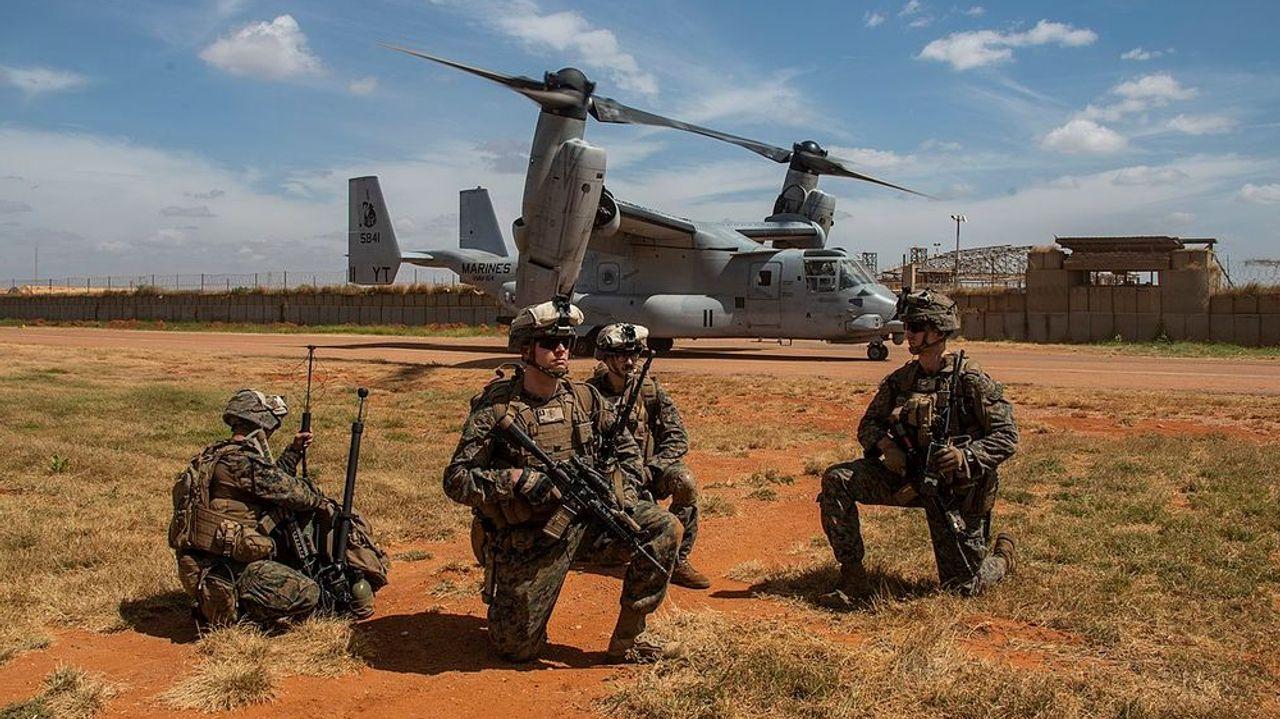
Biden also recently announced the provision of $9 million in military aid to the Somali army.
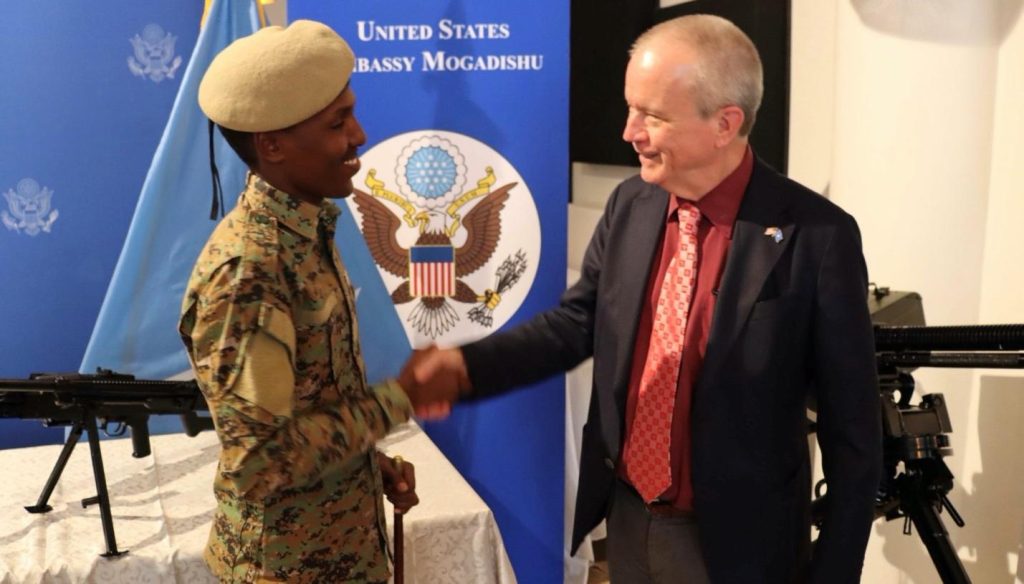
Decades of Imperial Intervention
Alex Findjis wrote in the World Socialist website that Somalia is strategically important for controlling trade through the Suez Canal and Red Sea. Up to $700 billion in maritime shipping passes by Somalia every year, encompassing nearly all trade between Europe and Asia, so U.S. control of the region has been imperative.
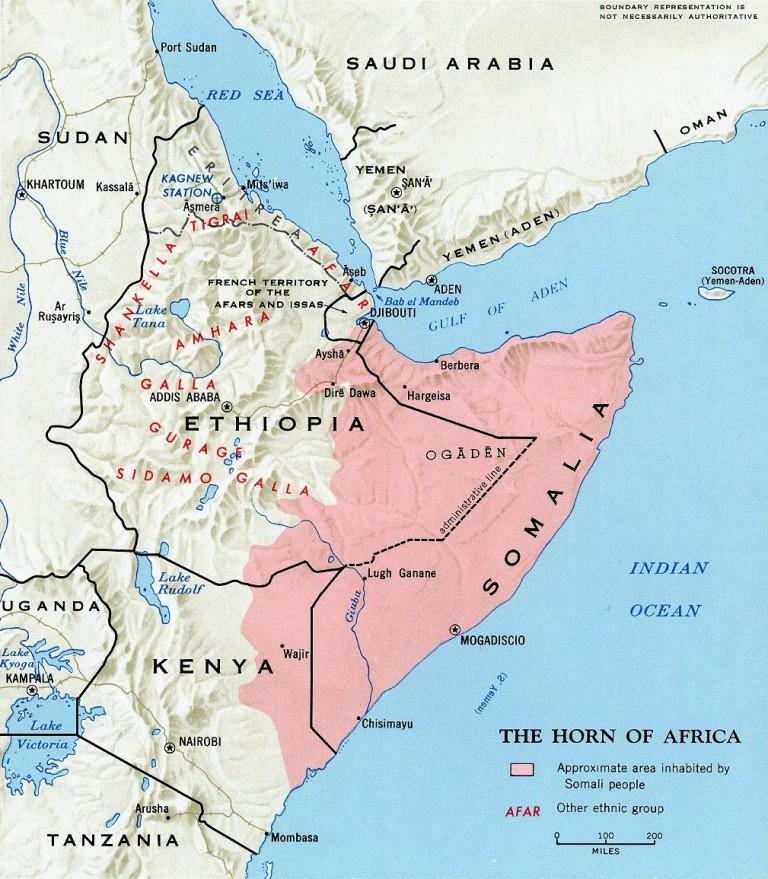
During the Cold War, the U.S. provided more than $1 billion in military aid to dictator Mohamed Siad Barre (1969-1992) in an attempt to curry his favor and pry him away from the Soviet orbit.
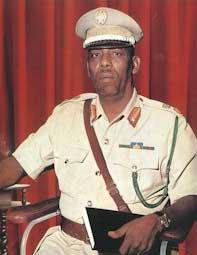
In 1992, President George H. W. Bush deployed 25,000 U.S. troops to Somalia after the country had descended into clan warfare.
The intervention ended in the infamous Black Hawk Down incident, where Mogadishu militia fighters loyal to Mohamed Farrah Aidid—whom the U.S. initially supported but then turned against when he spurned U.S. oil interests—shot down two Black Hawk helicopters using rocket-propelled grenades.
Mobs then hacked the fallen pilots to death with machetes and dragged their mutilated bodies through the streets.[1]
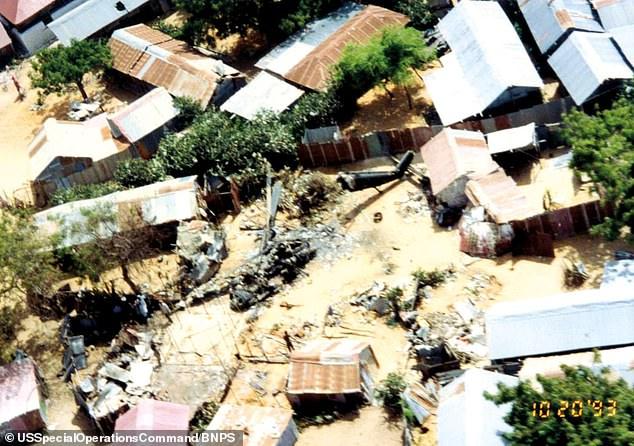
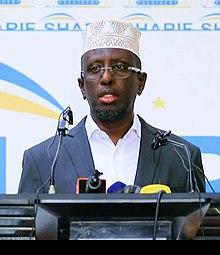
Resulting in large-scale civilian deaths, the U.S. military intervention fueled greater clan divisions and instability that lasted until 2006 when the Islamic Court Union (ICU) took over. Its leader, Sharif Sheikh Ahmed, drafted a letter to George W. Bush stating that he would cooperate with the U.S. in fighting terrorists.
The Bush administration was unconvinced, however, and sponsored an Ethiopian invasion that destabilized the country further and led to the rise of al-Shabab, a Salafist jihadist group linked to al-Qaeda which presented itself as the heir to Islamic fighters in Somalian history who had fought outside powers.

Director of National Intelligence John Negroponte authorized spy satellites that provided detailed pictures for Ethiopian troops and helped equip Ethiopian invaders with gunships and other high-tech weaponry. A consular official stated: “The idea was to get the Ethiopians to fight our war.”

In doing so, they carried out widespread killings, “slaughtering” men, women and children like “goats” by slitting their throats, according to Amnesty International. Air strikes killed scores of civilians, including nomadic herders and their families—in a pattern currently being repeated, it appears.[2]
Leave Somalia to the Somalians
The new Somali government installed by the U.S. and Ethiopia was run by “corrupted, immoral people selected by the international community,” said a Mogadishu businessman.
To fortify their power, the Obama and then Trump administrations sent commando teams and mercenaries, paid off local warlords known for torture and other brutalities, and launched large numbers of Predator drone strikes targeting al-Shabab leaders. The kill-and-capture campaign resulted in the assassination of Imams and several schoolteachers.[3]
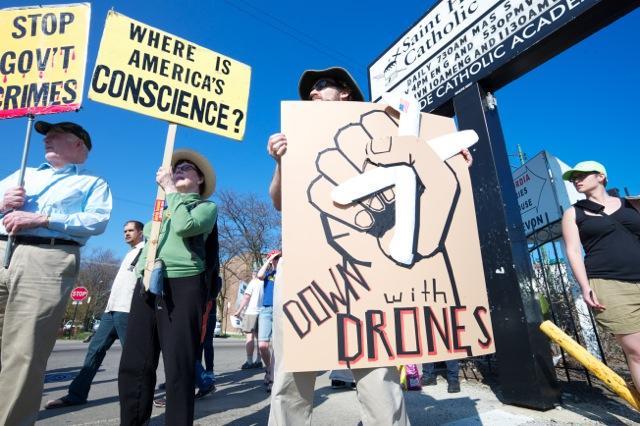
The Obama administration further equipped the African Union Mission in Somalia (AMISOM), led by a Ugandan contingent, which was accused of indiscriminate shelling of civilians and gang rape of girls as young as twelve.[4]

While al-Shabab used coercion and violence in resisting foreign intervention and Somalia’s quisling government, it also provided social services and showed superiority to the government in fundraising, financial management, tax collection and upholding the legal system, journalist Nick Alexandrov reports.

According to residents interviewed by BBC Africa Editor Mary Harper, al-Shabab “is present and visible in people’s lives in a way that government is not, especially in rural areas, and smaller towns and villages. For many, it is simply the best option available” and, in some respects, “has created the most effective system of governance Somalia has known since its collapse into chaos and conflict began in the late 1980s.”
When al-Shabab’s attacks extended into Uganda and Kenya, it prompted an invasion of southern Somalia by Kenyan defense forces trained and equipped by the U.S. who were implicated in alleged death-squad activity targeting Muslim clerics and youth leaders.[5]
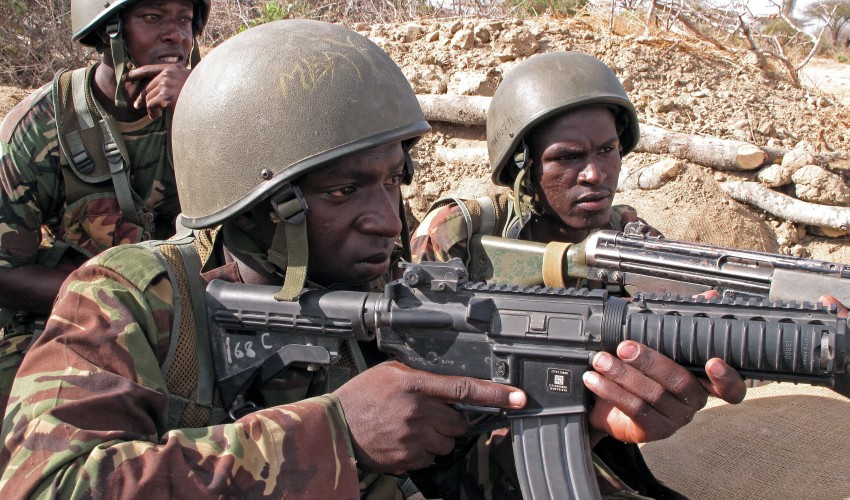
One Somalian reflected popular sentiment when he wrote in a blog in 2011 that “Somalis do not want ANY foreign invaders and intervention,” including Americans, Ugandans, Burundians (AMISOM) who are criminals (also did crimes in Congo) and have killed thousands of innocent Somalis. The best solution was to apologize to the Somali people, pay reparations for all the people killed, and leave Somalia to the Somali people.”[6]
A Fraudulent Election
Biden’s troop escalation corresponded with the election of Hassan Sheikh Mohamud as President of Somalia in May 2022.
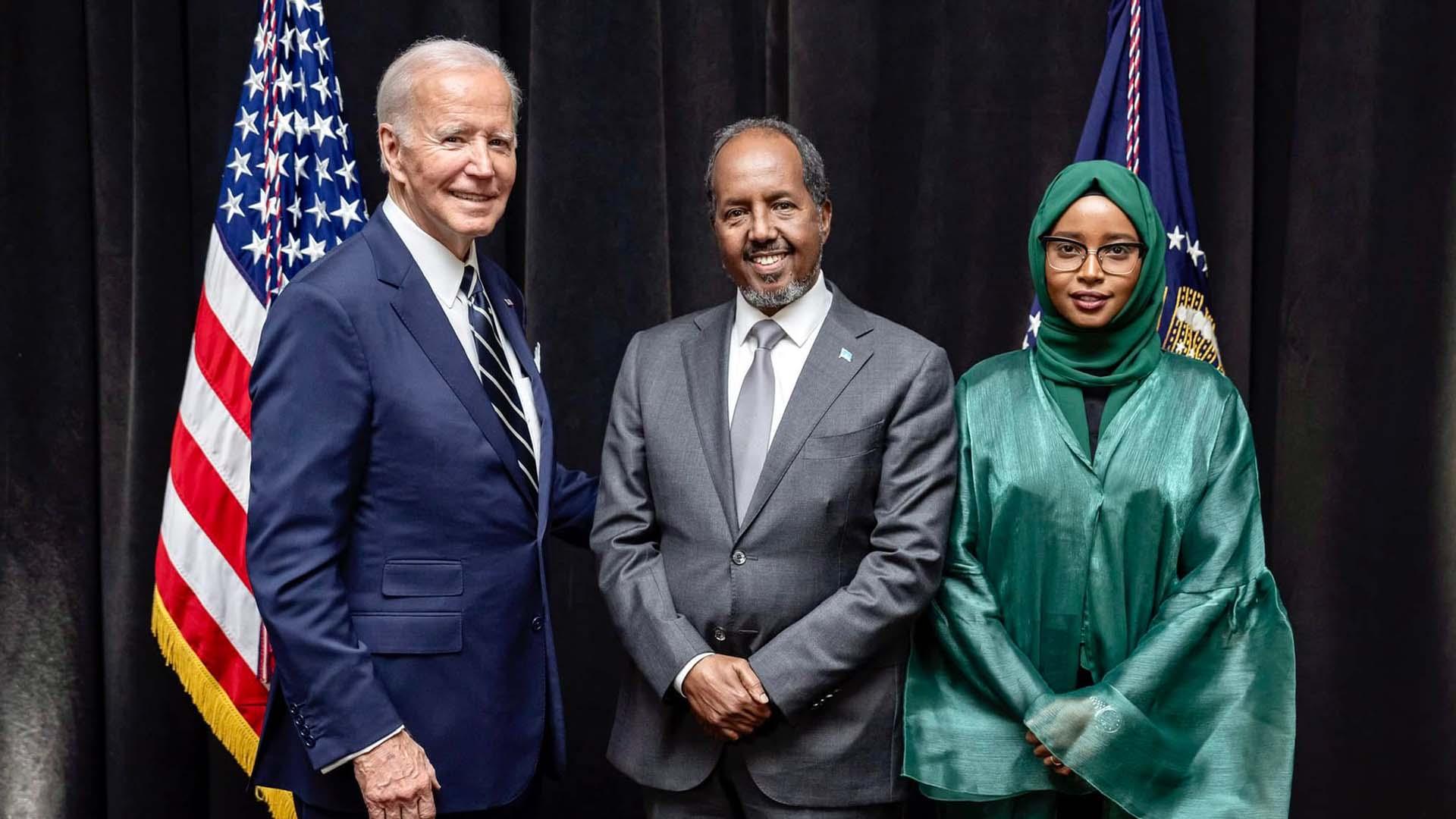
Mohamud previously served as Somali president from 2012 to 2017, during which time journalists were executed by firing squad and he was accused by a UN monitoring group of giving weapons to clan militias and al-Shabab, and conspiring with a U.S. law firm (Shulman Rogers) to steal overseas assets that had been recovered by the Somali Central Bank.
The UN Monitoring Group said the information it had gathered as of July 15, 2014, “reflect[ed] exploitation of public authority for private interests [under Mohamud] and indicates at the minimum a conspiracy to divert the recovery of overseas assets in an irregular manner.”[7]
Mohamud’s election last year ended a 15-month period of crisis after outgoing President Mohamed Abdullahi Farmaajo attempted to extend his term by two years, throwing the country into violent clashes between rival clans and political groups. [8]
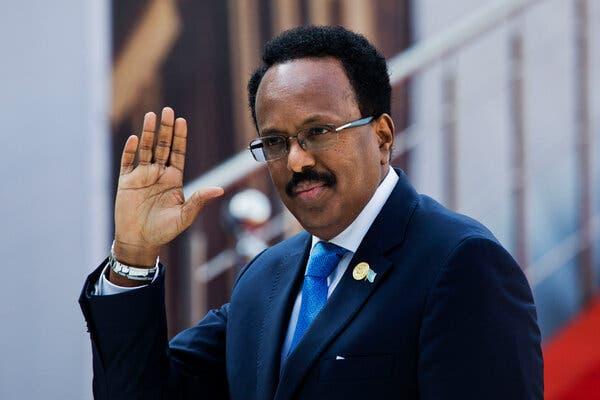
A former American citizen who studied history at the University of Buffalo and worked for the New York Department of Transportation, Farmaajo was defeated by Mohamud by a vote of 214 to 110 in the legislature.
Somalia’s elections do not include the 15 million people who live in the country. Instead, clan elders select delegates to represent them in parliamentary elections. The parliament then elects the president itself without any direct input from the general populace. Effectively, only a few hundred people have the right to vote in federal elections.
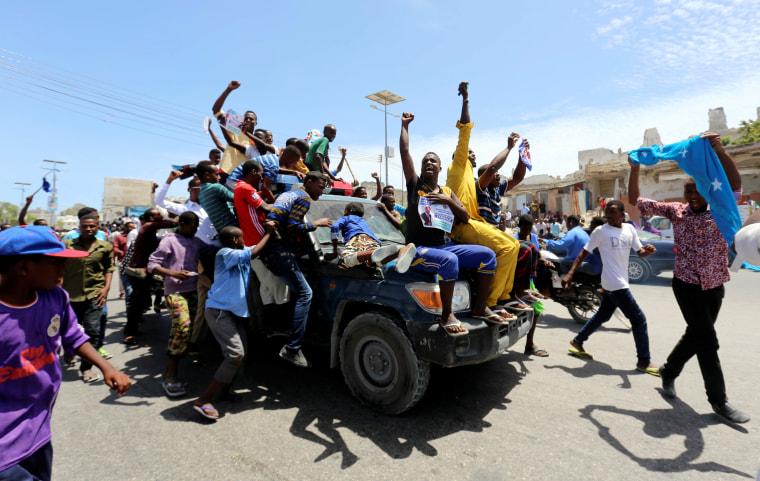
Known for helping to establish the Somali Institute of Management and Administration, which became one of the biggest universities in Somalia, Mohamud is a member of the Hawiye, one of the five largest and most politically influential clans in Somalia. He also leads the Union for Peace and Development Party, which currently controls a majority in both legislative chambers, securing his victory.
In an insult to the very concept of democracy, the U.S. State Department issued a statement congratulating “the people of Somalia on the conclusion of their national electoral process.” It continued by congratulating Mohamud on his election and encouraged him to “prioritize strengthening democratic governance and institutions.” How Mohamud is supposed to strengthen something that does not exist is unclear.
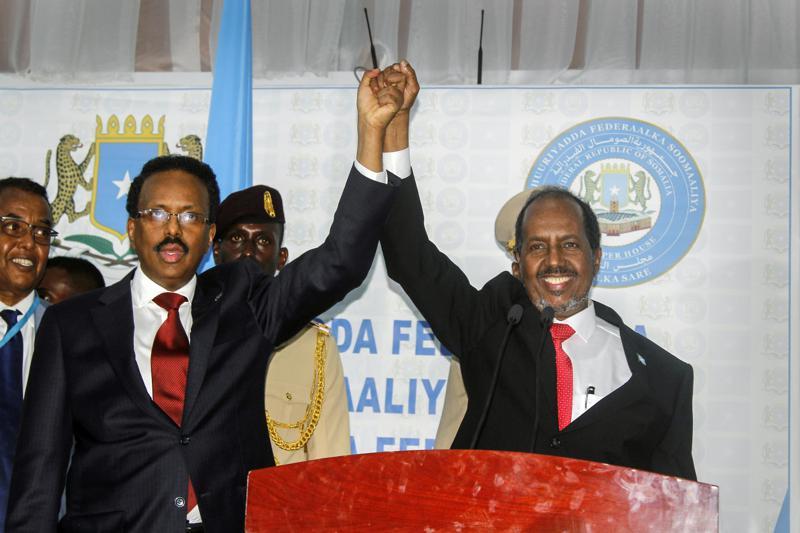
Keeping Somalia Open for Business
One main reason that the U.S. supports Mohamud is because of his friendliness toward U.S. oil investors in Somalia. Considered a “new frontier for hydrocarbon exploration,” Somalia possesses the largest untapped reserve of oil and longest unexplored coastline in Africa.
In October, Mohamud’s government signed a $7 million oil exploration agreement with Texas-based Coastline Exploration, despite the opposition of the Financial Governance Committee, a group of experts comprised of the Somali finance minister, parliamentarians, and World Bank members who warned against signing any oil deals because the country lacked a legal framework to protect its own interests.[9]

After signing the $7 million exploration deal, Coastline bragged in a press release that Somalia [under Mohamud] was “open for business”—a theme echoed by Mohamud who stated that the oil exploration agreement “highlight[ed] that Somalia is open for business and international investment after the conflict that has blighted the country for so many years.”
While granting Shell and ExxonMobil 30-year rights to offshore blocks for the fee of $1.7 million in 2019, Farmaajo had rejected the deal signed by the Petroleum Ministry with Coastline in February 2022.[10]
Coastline CEO William R. Anderson claimed that this deal was “fair” for Somalia, since there was a 5% royalty and profits were to be split evenly.

Jamal Kassim Mursal, former permanent secretary of the Somali Petroleum Ministry, however, said that the agreement was “unfair.” “A fixed oil royalty rate of 5% and a fixed gas royalty rate of 3%, government share becomes 59.8%,” he said. “However, if prices fall to $70 a barrel, government share stands at 50%. Any price below $70, government loses money to the contractor. Sixty dollars a barrel, government share becomes just 42%.”
Kenyan MP Farah Maalim accused President Mohamud of auctioning his country’s oil and gas resources in the deal. “There must be a legal regime that mandates Parliamentary approval for all & any contract on natural resources. Profit sharing agreement on oil & gas must be conducted in the open,” he tweeted. “Somalia sadly turned into another Angola today. President Hassan signed off Somali oil/gas.”
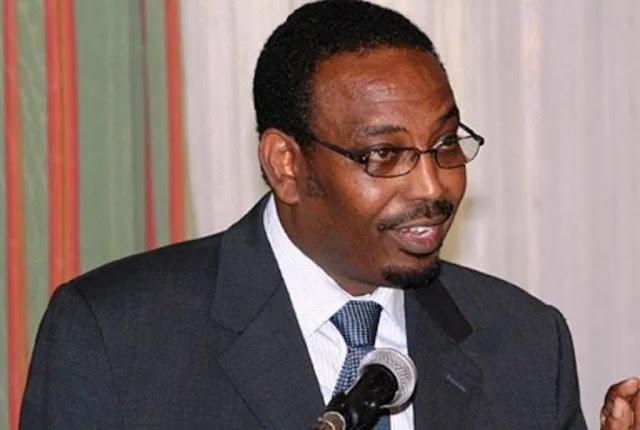
Masterminding Somalia’s Misrule
Black Agenda Report recently published an article entitled “Masterminding Somalia’s Misrule” by Dr. Abdiwahab Sheikh Abdisamad, executive director of the Institute for the Horn of Africa Studies who was abducted for 12 days by Kenyan police working as mercenaries for the Somali elite last year.
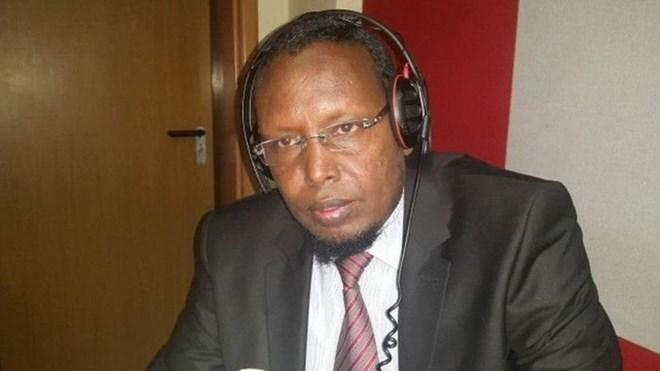
Dr. Abdisamad emphasized that in 2021, with the help of Ilhan Omar (D-MN), the Biden administration engineered the electoral defeat of Farmaajo, who had been trying to re-establish Somalia’s sovereignty and control of its own security forces, which was undone by his replacement, Hassan Sheikh Mohamud.
In late December, Omar met with Mohamud in Mogadishu and, at a dinner in her honor, congratulated the Somali leaders for the “big success” against al-Shabab which, she said, had “dishonored Islam.”[11]

But the Somali government has not actually enjoyed great success against al-Shabab—the war has dragged on for years—and has alienated a lot of the Somali population by killing many innocents—with U.S. backing.
According to Dr. Abdisamad, Mohamud ran an ugly campaign for president rife with hatred and the threat of violence. Mohamud tweeted a few weeks before the election, “If those who lead our country refuse to listen and accommodate the voices of reason, soon they will deal with those of unreasonable voices equipped with violence.”
Once in power, Mohamud, “went on the rampage, destroying legitimate institutions [such as the anti-corruption agency, a key economic advisory body, and judicial services commission], empowering clan militias, and going against anything that was in favor of the state-building process.” The army has become demoralized and government weapons have become available to clan militias, which use them in clan warfare.
The new Minister of Religious Affairs, Mukhtar Robow is one of the founders of al-Shabab. Fahad Yasin, the former head of Somalia’s National Intelligence and Security Agency (NISA), claimed that the current leader of Somalia’s spy agency, Mahad Salad, has a close relationship with al-Shabab and helped facilitate some of the group’s attacks on government officials.
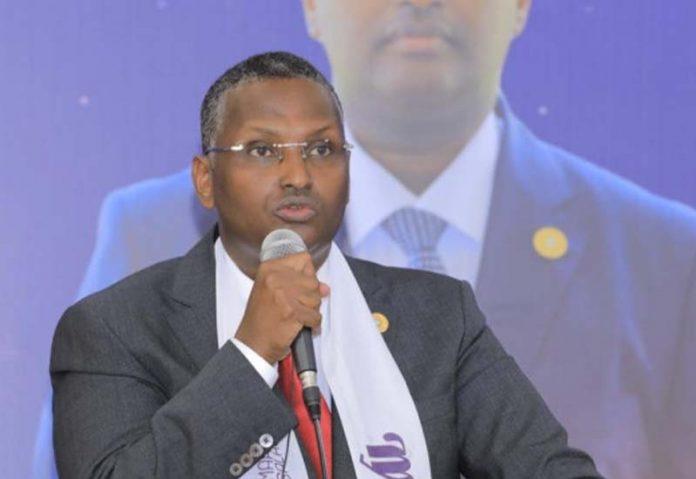
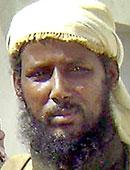
When a popular revolt against al-Shabab occurred in the Hiiraan Region, in central Somalia, in June 2022, Mohamud used it as an opportunity to arm his own clan militias. The result was to pit clans against one another, with al-Shabab regaining control there along with other regions.
This all raises big questions as to what the Biden administration is actually doing in Somalia or aims to achieve? If the government has a symbiotic relationship with al-Shabab and is empowering them, the ramping up of the U.S. military presence and drone strikes will likely only contribute further to their growth, while making oil exploration more difficult.
Dr. Abdisamad concluded his piece by writing:
“President Mohamud is not a disaster waiting to happen; he is a disaster that has already happened to Somalia. He is accused of swindling Somalia’s fortune during his first term (2012-2017), when he suddenly became one of the wealthiest men in Africa, in a country where more than half of the population rely on aid agencies for food, water, and medicine. It is difficult to predict what kind of chaos and destruction he will leave behind by the time he finishes his term in office. However, judging from what he has done so far in seven short months, the nation currently known as Somalia may no longer exist.”

-
See Mark Bowden’s classic, Black Hawk Down: A Story of Modern War (New York: Grove Press, 2010). ↑
-
Mark Mazzetti, The Way of the Knife: The CIA, a Secret Army, and a War at the Ends of the Earth (New York: Penguin Books, 2014), 148, 149; Jeremy Scahill, Dirty Wars: The World Is a Battlefield (New York: The Nation Books, 2013), 127, 128. On al-Shabab, see Hussein Solomon, “Somalia’s Al Shabaab: Clans vs Islamist Nationalism,” South African Journal of International Affairs, 21, 3 (2014), 351-366; Dan Joseph and Harun Maruf, Inside Al-Shabaab (Bloomington: Indiana University Press, 2018). ↑
-
Scahill, Dirty Wars, 127, 128; Jeremy Kuzmarov, Obama’s Unending Wars: Fronting the Foreign Policy of the Permanent Warfare State (Atlanta: Clarity Press, 2019), 94, 95. One of the U.S.-trained warlords, General Yusuf Mohamed Siad (AKA Indha Adde), who was known as “the butcher,” told Jeremy Scahill: “America knows war, they are war masters. They are teachers, great teachers.” ↑
-
Kuzmarov, Obama’s Unending Wars, 95. ↑
-
David M. Anderson and Jacob McKnight, “Kenya at War: Al-Shabaab and Its Enemies in Eastern Africa,” African Affairs, December 2014. ↑
-
Quoted in Kuzmarov, Obama’s Unending Wars, 95, 96. ↑
-
Kuzmarov, Obama’s Unending Wars, 95; Louis Charbonneau, “Exclusive: U.N. monitors allege ‘conspiracy” to divert Somali assets,” Reuters, July 15, 2014, https://www.reuters.com/article/us-somalia-corruption-un-exclusive-idUSKBN0FL07220140716; Moulid Hujale, “Hassan Mohamud: The Second Coming of Somalia’s New President,” Al Jazeera, May 18, 2022, https://www.aljazeera.com/features/2022/5/18/somalias-new-president. In the 1990s, Mohamud had been known regionally for resolving clan disputes. Yussur Abrar, who was governor of the central bank, resigned over corruption in Mohamud’s administration. In her letter to Mohamud, she said: “From the moment I was appointed I have been continuously asked to sanction deals and transactions that would contradict my personal values and violate my fiduciary responsibility to the Somali people as head of the nation’s monetary authority.” In December 2020, a federal grand jury returned an indictment charging Maryland lawyer Jeremy Schulman of Bethesda, Maryland, on federal charges for wire fraud, mail fraud, bank fraud, and money laundering conspiracies, and three counts of wire fraud, one count of mail fraud, one count of bank fraud, and four counts of money laundering, in connection with his alleged participation in a scheme to defraud financial institutions of more than $12.5 million that was held on behalf of the Somali government. ↑
-
Guled Hagi Hersi provides a critical view of Farmaajo in his article “The Rise and Fall of Farmaajo,” Wardheer News, July 6, 2018, https://wardheernews.com/the-rise-and-fall-of-farmaajo/, as does Guled Ahmed in “Somali President Farmaajo Attempts a Silent Coup,” The National Interest, January 19, 2021, https://nationalinterest.org/blog/middle-east-watch/somali-president-farmaajo-attempts-silent-coup%C2%A0-176655. Ahmed points out that Farmaajo employed former Trump adviser Roger Stone as a lobbyist, and like Trump had a dangerous autocratic bent. Ikran Tahlil Farah, a young Somali civil servant working in the National Intelligence and Security Agency disappeared after allegedly discovering the illegal transfer of Somali conscripts to Eritrea, and Farmaajo blocked any investigation into her disappearance/death. Farmaajo was further accused of attacking Ahlu Sunna Waljama, the most successful indigenous group fighting al-Shabab, in order to sideline competition. ↑
-
Founded in 2018, Coastline Exploration has contractual possession of Soma Oil & Gas, a company that collected seismic data off Somalia’s shore. According to Voice of America, Soma Oil & Gas was previously investigated by the United Kingdom’s Serious Fraud Office but was later cleared of wrongdoing because of “insufficient evidence.” Some of the board members of Soma Oil & Gas, including Coastline CEO William R. Anderson and Alexander Dzhaparidze, a Russian-Georgian billionaire, are board members of Coastline Exploration. Anderson told Voice of America that Coastline Exploration is not corrupt and has complied with U.S. and Somali law. ↑
-
Farmaajo may have also been opposed by the U.S. because he supported a Tripartite agreement between Somalia, Ethiopia and Eritrea that promised greater regional economic integration that could undercut U.S. interests and efforts to dominate the Horn of Africa region. ↑
-
Omar, however, never accused Somali government forces of dishonoring Islam despite their role in killing and displacing civilians, murdering protesters, and routinely carrying out rape and torture. A recent report on their sexual violence concluded that “impunity was the norm” for them. Ann Garrison recently wrote an article in Black Agenda Report, “Ilhan Omar Is Not Mama Africa,” pointing to Omar’s betrayal of the African people through her endorsement of AFRICOM and support for the murderous Kagame regime in Rwanda, a longtime U.S. client which has plundered the wealth of the Congo, along with her support for the Tigrayan People’s Liberation Front (TPLF), which instigated war in Ethiopia and committed large-scale atrocities. New House Speaker Kevin McCarthy’s reasons for ousting her from the House Foreign Affairs committee are dubious but this does not make her progressive or a friend of Africans by any stretch. ↑
CovertAction Magazine is made possible by subscriptions, orders and donations from readers like you.
Blow the Whistle on U.S. Imperialism
Click the whistle and donate
When you donate to CovertAction Magazine, you are supporting investigative journalism. Your contributions go directly to supporting the development, production, editing, and dissemination of the Magazine.
CovertAction Magazine does not receive corporate or government sponsorship. Yet, we hold a steadfast commitment to providing compensation for writers, editorial and technical support. Your support helps facilitate this compensation as well as increase the caliber of this work.
Please make a donation by clicking on the donate logo above and enter the amount and your credit or debit card information.
CovertAction Institute, Inc. (CAI) is a 501(c)(3) non-profit organization and your gift is tax-deductible for federal income purposes. CAI’s tax-exempt ID number is 87-2461683.
We sincerely thank you for your support.
Disclaimer: The contents of this article are the sole responsibility of the author(s). CovertAction Institute, Inc. (CAI), including its Board of Directors (BD), Editorial Board (EB), Advisory Board (AB), staff, volunteers and its projects (including CovertAction Magazine) are not responsible for any inaccurate or incorrect statement in this article. This article also does not necessarily represent the views the BD, the EB, the AB, staff, volunteers, or any members of its projects.
Differing viewpoints: CAM publishes articles with differing viewpoints in an effort to nurture vibrant debate and thoughtful critical analysis. Feel free to comment on the articles in the comment section and/or send your letters to the Editors, which we will publish in the Letters column.
Copyrighted Material: This web site may contain copyrighted material the use of which has not always been specifically authorized by the copyright owner. As a not-for-profit charitable organization incorporated in the State of New York, we are making such material available in an effort to advance the understanding of humanity’s problems and hopefully to help find solutions for those problems. We believe this constitutes a ‘fair use’ of any such copyrighted material as provided for in section 107 of the US Copyright Law. You can read more about ‘fair use’ and US Copyright Law at the Legal Information Institute of Cornell Law School.
Republishing: CovertAction Magazine (CAM) grants permission to cross-post CAM articles on not-for-profit community internet sites as long as the source is acknowledged together with a hyperlink to the original CovertAction Magazine article. Also, kindly let us know at info@CovertActionMagazine.com. For publication of CAM articles in print or other forms including commercial internet sites, contact: info@CovertActionMagazine.com.
By using this site, you agree to these terms above.
About the Author

Jeremy Kuzmarov holds a Ph.D. in American history from Brandeis University and has taught at numerous colleges across the United States. He is regularly sought out as an expert on U.S. history and politics for radio and TV programs and co-hosts a radio show on New York Public Radio and on Progressive Radio News Network called “Uncontrolled Opposition.”
He is Managing Editor of CovertAction Magazine and is the author of six books on U.S. foreign policy, including Obama’s Unending Wars (Clarity Press, 2019), The Russians Are Coming, Again, with John Marciano (Monthly Review Press, 2018), Warmonger. How Clinton’s Malign Foreign Policy Launched the U.S. Trajectory From Bush II to Biden (Clarity Press, 2023); and with Dan Kovalik, Syria: Anatomy of Regime Change (Baraka Books, 2025).
Besides these books, Kuzmarov has published hundreds of articles and contributed to numerous edited volumes, including one in the prestigious Oxford History of Counterinsurgency .
He can be reached at jkuzmarov2@gmail.com and found on substack here.


